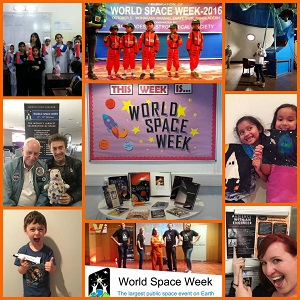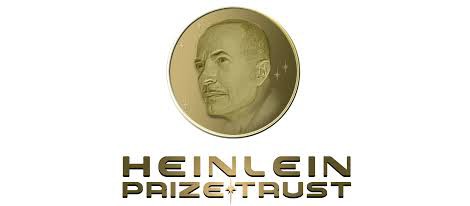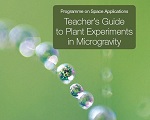Educational Resources
Inspiring the next generation
 World Space Week is the largest space event in the world and an ideal time for teachers and educators to use space-based activities to excite students about science and technology. We are featuring in particular, our ‘Heinlein Teacher Guide’ and ‘WSW Teacher Activity Guide’, which are fantastic resources to promote and use in the classroom. You can download these below. In addition to that we have access to a wealth of education material through our global network of Space and STEM education partners.
World Space Week is the largest space event in the world and an ideal time for teachers and educators to use space-based activities to excite students about science and technology. We are featuring in particular, our ‘Heinlein Teacher Guide’ and ‘WSW Teacher Activity Guide’, which are fantastic resources to promote and use in the classroom. You can download these below. In addition to that we have access to a wealth of education material through our global network of Space and STEM education partners.
Heinlein Teacher Guide
The World Space Week Heinlein Teacher Guide is a collection of science and language arts activities for children in grades 5-9, which are based on the book “Have Spacesuit – Will Travel” by Robert A. Heinlein. The guide is sponsored by the Heinlein Prize Trust.
- Heinlein Teacher Guide in Chinese (pdf)
- Heinlein Teacher Guide in Czech (pdf)

- Heinlein Teacher Guide in English (pdf)
- Heinlein Teacher Guide in French (pdf)
- Heinlein Teacher Guide in Italian (pdf)
- Heinlein Teacher Guide in Japanese (pdf)
- Heinlein Teacher Guide in Korean (pdf)
- Heinlein Teacher Guide in Malaysian (pdf)
- Heinlein Teacher Guide in Spanish (pdf)
- Teacher Feedback form (pdf)
WSW Teacher Activity Guide
This activity guide is designed for use in grade K-12 (US). Download it here:
UNOOSA Teacher’s Guide
 The United Nations Office for Outer Space Affairs (UNOOSA) issued an interesting Teacher’s Guide to plant experiments in microgravity, as part of the Human Space Technology Initiative in 2013. It describes classroom experiments that can be performed with a clinostat, a device to simulate microgravity for plant growth experiments.
The United Nations Office for Outer Space Affairs (UNOOSA) issued an interesting Teacher’s Guide to plant experiments in microgravity, as part of the Human Space Technology Initiative in 2013. It describes classroom experiments that can be performed with a clinostat, a device to simulate microgravity for plant growth experiments.
International Space Station Educator’s Resource Guide
Our newest sponsor Lockheed Martin created a great teacher’s guide about the International Space Station, together with NASA. It describes activities for grades 3 to 9, relating to all disciplines that are studied on board the real station. In addition Lockheed Martin contributes to several STEM Education initiatives, including its Engineers in the Classroom project with National Geographic.
- Space Station Educator’s Resource Guide
- Lockheed Martin STEM Education Program
- National Geographic EITC – Engineers in the Classroom
World Space Week Partners’ Resources
World Space Week works with several international NGO partners that share our education and outreach goals. Notably the Space Foundation and UNAWE have great resources for teachers. UNAWE was successful in crowdfunding its great ‘Universe in a box’ that can be ordered from their website. Have a look:
NASA Education Resources
During its long history NASA has become one of the largest producers of high quality education material, aimed at all grades and ages, covering all aspects of NASA’s activities in space and astronomy. Browse through this long list of great and free-to-use teaching material. There will certainly be something you can use!
ESA Teachers’ Corner
The European Space Agency (ESA) has a dedicated Education Office, producing a wealth of classroom resources for many age groups. These resources are available free of charge, both online and offline. Great thing is that most materials are available in many languages, offering great activities in your local language. The ESA website has several ways to access the material. Here are a few:
- ESA Teachers’ Corner
- Solar System and Universe
- Earth and Environment
- Astronauts and the International Space Station
- Rockets and Technology Resources
European Space Education Resource Office (ESERO)
The European Space Education Resource Office (ESERO) project is ESA’s main way of supporting the primary and secondary education community in Europe. ESERO uses space related themes and the genuine fascination felt by young people for space to enhance school pupils’ literacy and competence in STEM-related subjects. The ESERO project also highlights the associated applications from space and raises awareness of the large range of career prospects in the space domain. It is organized by country:
- Belgium ESERO – L’espace en classe
- Belgium ESERO – Schiet uw school de ruimte in
- Czech Republic ESERO – Vzdělávací kancelář Evropské vesmírné agentury
- Denmark ESERO
- Germany ESERO
- Ireland ESERO – Education Project
- Italy ESERO
- The Netherlands ESERO – Ruimtevaart in uw klas
- Nordic ESERO – School Projects
- Poland ESERO
- Portugal ESERO
- Romania ESERO
- Spain ESERO – Del Espacio al Aula
- UK ESERO – Space Education Office
EUMetSat Learning Zone
The place to learn about monitoring the weather and climate from space. A new initiative by the leading European Weather Satellite operator EUMetSat is the Learning Zone. Great teacher and student activities in the areas of weather, atmosphere, oceans, climate and spacecraft.
GalileoMobile
GalileoMobile is a non-profit, itinerant, science education initiative that brings modern astronomy closer to young people around the world, with emphasis in regions that have little or no access to other outreach actions. The initiative was created in late 2008 inspired by the International Year of Astronomy 2009 (IYA2009) and is currently run by a crazy bunch of astronomers, educators, and science communicators.
Galileo Educational Network
The Galileo Educational Network was proud to serve as the professional learning arm of the Werklund School of Education at the University of Calgary during which time they pioneered a mentoring approach for continuous professional learning.
Space Awareness – Educate & Inspire
The project strives to inform children and young adults about current research and issues related to space sciences and the numerous career opportunities offered by space, and to show them that space science can be fun and inspiring. Educators can benefit immensely from the project by taking advantage of the large array free high-quality resources that are easily adaptable to different disciplines and countries. Space Awareness offers a series of complementary activities and resources to inspire children from 8 to 18 years old, primary and secondary school teachers, teacher trainers, science educators, and families.
Pakistan Space & Upper Atmosphere Research Commission (SUPARCO)
